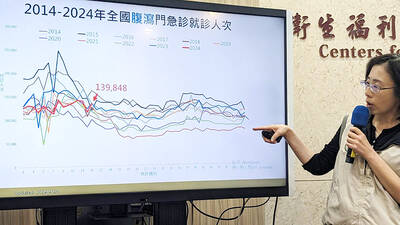Although Taiwan has been removed from World Health Organization's list of SARS-affected areas, the debate over where to draw the line between the public's right to know and journalistic sensationalism continues.
According to a poll conducted by the Broadcasting Development Fund on May 2, around 65 percent of the 1,093 respondents polled thinks SARS-related news reports were "overly sensational," while nearly 30 percent said the news reports highlighting the SARS crisis was unbearably repetitive.
The SARS outbreak erupted in Taiwan in mid-April.
The fund's chief executive Lu Shih-Hsiang (
"With over six news channels on the air in this country, it's quite beyond doubt that speed has outpowered accuracy in an extremely competitive TV news industry," Lu said.
Lu added that what really matters to the public in this kind of situation is accurate information.
Lin Tian Chiung (
"We had to spare no effort when informing the viewers about the latest SARS-related developments," Lin said.
Lin dismissed the survey's results and said that he was trying so desperately to moderate the public's fear of the virus by making news stories which featured lucky people who had conquered the virus.
Paul Tsai (
"Taiwan's TV news industry lacks a basic awareness of the ABCs of good journalism," Tsai said.
Tsai suggested that the media should have spent more time putting checking facts and double checking facts to ensure their accuracy.
Tsai said that TV stations, after their poor performance covering the SARS epidemic, should have learned that they need to hire professionally trained reporters whose expertise is in the medical field.
"It's imperative that my reporters get some medical training before the next fatal bug comes along," Tsai said.
Tsai's ideal news team to better cope with a SARS-like virus would include medical experts who could clearly explain the latest developments, and well-prepared journalists who are able to provide most comprehensible reports.
After the SARS outbreak, academics and journalists are beginning to question the longtime belief that blood, fear and tears will pump ratings, and in turn, lead to more ad revenue.
Based on data released by the AC Nielsen rating company on May 28, overall TV ratings rose to 11.4 in May, notably from 10.28 in January.
Evening news programs saw ratings grow from 0.48 in January to 0.53 in May.
"It's too bad the higher ratings did not bring in more ad revenue," Tsai said.
Tsai said that when a TV station covers a topic as volatile as SARS, it would be unwise or even asinine to try to attract advertisers by spicing up the stories.
Hsu Mei-ling (
Claire Hsiao (蕭慧芬), a reporter at FTV, still optimistically believes that the media will get back on track.
Hsiao thinks the war on SARS is a good example of ratings not translating into revenue.
The litmus test for the media, Hsiao said, is going to be whether the media chooses ethics over sensationalism when the next epidemic arrives.

FLU SEASON: Twenty-six severe cases were reported from Tuesday last week to Monday, including a seven-year-old girl diagnosed with influenza-associated encephalopathy Nearly 140,000 people sought medical assistance for diarrhea last week, the Centers for Disease Control (CDC) said on Tuesday. From April 7 to Saturday last week, 139,848 people sought medical help for diarrhea-related illness, a 15.7 percent increase from last week’s 120,868 reports, CDC Epidemic Intelligence Center Deputy Director Lee Chia-lin (李佳琳) said. The number of people who reported diarrhea-related illness last week was the fourth highest in the same time period over the past decade, Lee said. Over the past four weeks, 203 mass illness cases had been reported, nearly four times higher than the 54 cases documented in the same period

A group of Taiwanese-American and Tibetan-American students at Harvard University on Saturday disrupted Chinese Ambassador to the US Xie Feng’s (謝鋒) speech at the school, accusing him of being responsible for numerous human rights violations. Four students — two Taiwanese Americans and two from Tibet — held up banners inside a conference hall where Xie was delivering a speech at the opening ceremony of the Harvard Kennedy School China Conference 2024. In a video clip provided by the Coalition of Students Resisting the CCP (Chinese Communist Party), Taiwanese-American Cosette Wu (吳亭樺) and Tibetan-American Tsering Yangchen are seen holding banners that together read:

Heat advisories were in effect for nine administrative regions yesterday afternoon as warm southwesterly winds pushed temperatures above 38°C in parts of southern Taiwan, the Central Weather Administration (CWA) said. As of 3:30pm yesterday, Tainan’s Yujing District (玉井) had recorded the day’s highest temperature of 39.7°C, though the measurement will not be included in Taiwan’s official heat records since Yujing is an automatic rather than manually operated weather station, the CWA said. Highs recorded in other areas were 38.7°C in Kaohsiung’s Neimen District (內門), 38.2°C in Chiayi City and 38.1°C in Pingtung’s Sandimen Township (三地門), CWA data showed. The spell of scorching

UNAWARE: Many people sit for long hours every day and eat unhealthy foods, putting them at greater risk of developing one of the ‘three highs,’ an expert said More than 30 percent of adults aged 40 or older who underwent a government-funded health exam were unaware they had at least one of the “three highs” — high blood pressure, high blood lipids or high blood sugar, the Health Promotion Administration (HPA) said yesterday. Among adults aged 40 or older who said they did not have any of the “three highs” before taking the health exam, more than 30 percent were found to have at least one of them, Adult Preventive Health Examination Service data from 2022 showed. People with long-term medical conditions such as hypertension or diabetes usually do not